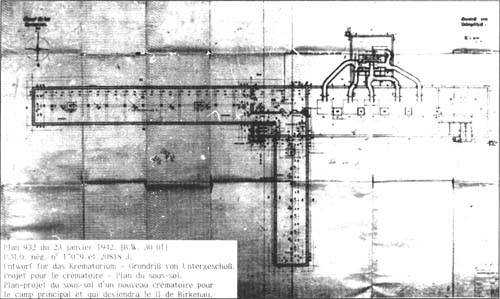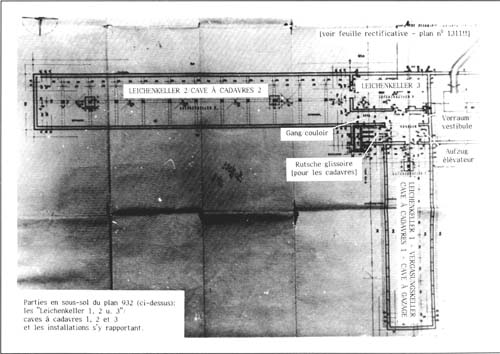|
|
 |
 |
AUSCHWITZ:
Technique
and Operation
of
the Gas Chambers © | |
|
| |
 |
Back |
 |
Contents |
Page 505 |
 |
Home
Page |
Forward |
 |
| |
| adding a sentence assimilating the ventilation and air
extraction system of Leichenkeller I with the air supply to the
furnaces: |
| |
“For example in the letter of 29th January 1943 quoted
at me (a letter not even carrying the usual indication “secret”)
Vergasung does not mean “gassing”, but “carburetion” [though Butz
in fact had suggested ”gas generation”!]. Vergasungskeller
designates the room where the “gaseous” mixture to fuel the
crematorium furnace was prepared. These furnaces, with their air
supply and extraction systems, came from Messrs. Topf and Sons of
Erfurt (NO-4473).” |
| |
| Having realized the inconsistency of his argument, a rather more
realistic Faurisson, i n his “Reply to Pierre
Vidal-Naquet”, gave a second version under point 16:
|
| |
“What V-N calls or baptizes the “gas chamber” of
crematorium No. 2 was a “Leichenkeller”, a typical cool room ...
“A cool room has to be disinfected. For this they used
Zyklon-B, an insecticide invented in 1917 and still used
today all over the world” ! [words underlined by the present
author]. |
| |
And so Faurisson, so persnickety about words, became the first
person in the history of bacteriology to DESTROY PATHOGENIC GERMS
WITH AN INSECTICIDE, forgetting the most common of effective
disinfectants, BLEACH. This needs no comment.
Lastly,
following my discovery of a “Tagesbericht / timesheet” in which a
civilian worker had written that a room in the western part of
Krematorium IV was a “Gasskammer / gas chamber” , Faurisson, now
with his back to the wall. Suggested, a third desperate version in
the second edition of the “Reply to Pierre
Vidal-Naquet”, page 78: “It is likely that the two rooms
found suspect by J-C Pressac in crematoriums IV and V were
disinfection gas chambers” [underlined by J-C.-
P.].
From the translation of ,Vergasungskeller in Krematorium
II by “gas generation cellar”, to that of “Gasskammer” in
Krematorium IV by “disinfection gas chamber”, there is quite a
climbdown. And yet. the sacred axiom still remains unchanged:
“homicidal gas chambers never existed”.
From the technical
standpoint, a brief examination of the different types of cremation
furnaces designed and installed by Topf & Sons [see Part II,
Chapter 1] in the Buchenwald, Mauthausen and Auschwitz-Birkenau
concentration camps, all of which operated without any kind of gas
generation or carburetion [in fact they were coke-fired!], makes it
possible to assess at their true value the theories put forward by
Butz (a graduate of the Massachusetts Institute of Technology)
regarding “gas generation” and Faurisson (literary man and textual
critic), with his first legend of “carburetion”, second of
“disinfected morgue” [using Zyklon-B!] and the final attempt at
evasion, “disinfection gas chamber” lwhich should in any case be
“disinfestation” to make sense].
The credit for highlighting
this letter of 29th January 1943 and using it against the
revisionists unquestionably goes to Father G. Wellers, This letter,
TAKEN TOGETHER WITH the Prüfer report, provides very important
evidence, but does not in itself constitute absolute proof of the
existence of a HOMICIDAL gas chamber in the basement of Birkenau
Krematorium II. |
| |
| * |
|
 |
Document 3
Drawing
932 of 23rd January 1942
[BW 30/01 PMO neg. nos. 17079 and
20818/3]
Entwurf für das Krematorium - Grundriß
von Untergeschoß
/ Projected crematorium - basement plan.
Originally planned as a new crematorium for the main camp, this
building was to become Birkenau Krematorium II |
|
Document: 4
Basement part of drawing 932 (above) depicting
“Leichenkeller 1, 2 u. 3 / corpse cellars 1, 2 and 3”, and the
installations connected with them. |
 |
|
| |
Translation of
inscriptions: |
|
| |
|
|
| |
· |
voir feuille rectificative /
plan no 1311!!
see correction sheet - drawing 1311 !!] |
|
| |
· |
LEICHENKELLER 2 / CORPSE CELLAR
2 |
|
| |
· |
LEICHENKELLER 3 Gang /
corridor |
|
| |
· |
Rutsche / [corpse]
chute |
|
| |
· |
Vorraum / vestibule |
|
| |
· |
Aufzug / [corpse] lift |
|
| |
|
|
| |
LEICHENKELLER 1 =
VERGASSUNGSKELLER |
|
| |
CORPSE CELLAR 1 =
GASSING CELLAR |
| |
| |
AUSCHWITZ:
Technique
and operation
of the gas chambers
Jean-Claude Pressac
© 1989, The
Beate Klarsfeld Foundation |
 |
Back |
Page 505 |
Forward |
 |
|

